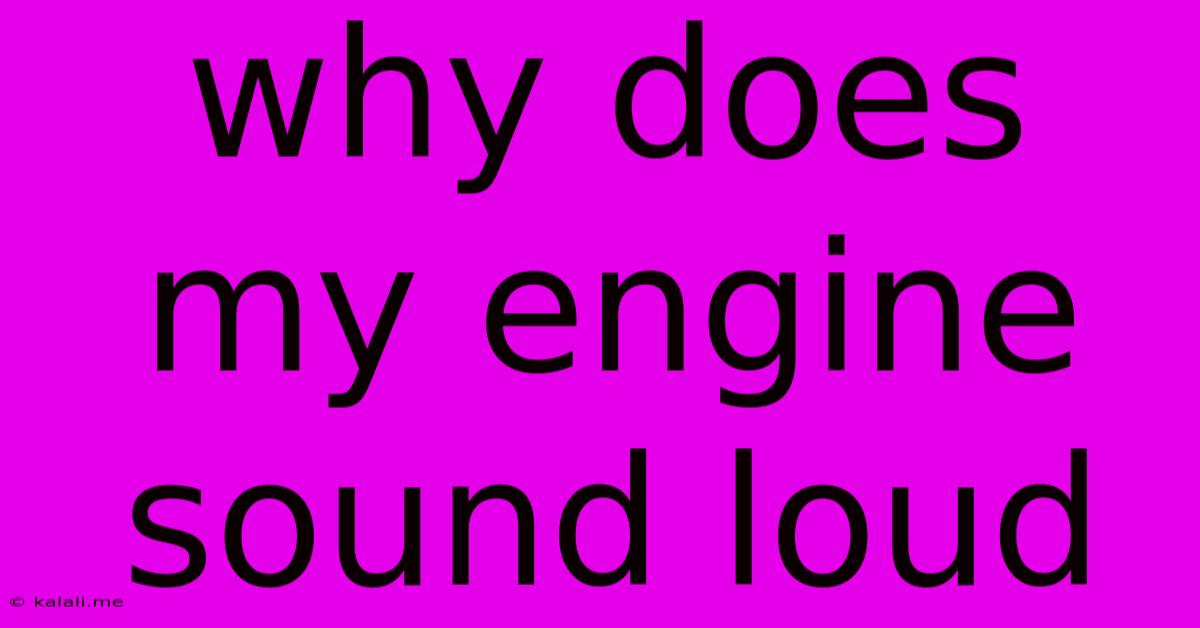Why Does My Engine Sound Loud
Kalali
Jun 05, 2025 · 3 min read

Table of Contents
Why Does My Engine Sound Loud? A Comprehensive Guide to Diagnosing Engine Noise
Is your car engine making more noise than usual? A loud engine can be a worrying sign, indicating a potential problem that needs attention. This comprehensive guide explores the common causes of excessive engine noise, helping you understand what might be wrong and when you should seek professional help. Ignoring unusual engine sounds can lead to more serious and costly repairs down the line, so early detection is key.
Common Causes of Loud Engine Noise
Several factors can contribute to a louder-than-normal engine sound. These can range from relatively minor issues to more serious mechanical problems. Let's examine some of the most frequent culprits:
-
Loose or Damaged Belts: Worn, loose, or damaged serpentine belts (the ones that drive your alternator, power steering pump, and other accessories) can create a high-pitched squeal or whine, particularly when the engine is cold or under load. This is often accompanied by a visible sign of wear and tear on the belt itself.
-
Worn or Damaged Bearings: Bearings are crucial components within the engine, supporting rotating parts like the crankshaft and camshaft. Worn or damaged bearings produce a characteristic grinding or rumbling sound. The severity of the noise usually correlates with the extent of bearing wear; the louder the noise, the more serious the problem.
-
Exhaust System Leaks: Leaks in the exhaust system, such as a cracked muffler or loose connection, can create a loud rumbling or popping sound. Exhaust leaks are not only noisy but can also reduce engine performance and even pose safety hazards due to carbon monoxide exposure.
-
Low Engine Oil: Insufficient engine oil leads to increased friction between moving parts, resulting in a noticeable knocking or tapping sound. This can quickly damage the engine if not addressed promptly. Regularly checking your oil level is crucial for preventing this issue.
-
Worn Piston Rings: Worn piston rings allow combustion gases to escape into the crankcase, leading to a clattering or knocking sound. This is often accompanied by excessive oil consumption and blue smoke from the exhaust.
-
Timing Chain or Belt Issues: A noisy timing chain or belt can indicate imminent failure. A rattling or slapping sound from the timing chain area warrants immediate professional inspection, as a broken timing belt or chain can cause catastrophic engine damage.
-
Valvetrain Problems: Worn or damaged valve lifters, rocker arms, or pushrods can create a clicking or ticking sound from the top end of the engine. This noise often becomes more prominent during engine warm-up.
-
Failing Water Pump: A failing water pump can create a whining or squealing sound, particularly noticeable when the engine is cold. This is often accompanied by overheating and coolant leaks.
When to Seek Professional Help
While some minor adjustments, like tightening a loose belt, might be doable at home, many of the issues listed above require the expertise of a qualified mechanic. Don't hesitate to consult a professional if:
- The noise is severe or worsening.
- You're unsure of the cause of the noise.
- The noise is accompanied by other symptoms, such as reduced engine performance, overheating, or smoke.
- You lack the necessary tools or experience to diagnose and repair the problem.
Ignoring a loud engine sound can lead to costly repairs, further damage, and even engine failure. Regular maintenance, including oil changes and inspections, is crucial in preventing many of these issues. By understanding the potential causes and seeking professional help when needed, you can maintain your vehicle's health and safety.
Latest Posts
Latest Posts
-
How Long Does Diatomaceous Earth Take To Kill Bed Bugs
Jun 06, 2025
-
Zip R Recursive Files In Folder
Jun 06, 2025
-
Why Do My Cats Like To Play Wrestle
Jun 06, 2025
-
Can 2 Circuits Share A Neutral
Jun 06, 2025
-
What Have Been You Up To
Jun 06, 2025
Related Post
Thank you for visiting our website which covers about Why Does My Engine Sound Loud . We hope the information provided has been useful to you. Feel free to contact us if you have any questions or need further assistance. See you next time and don't miss to bookmark.